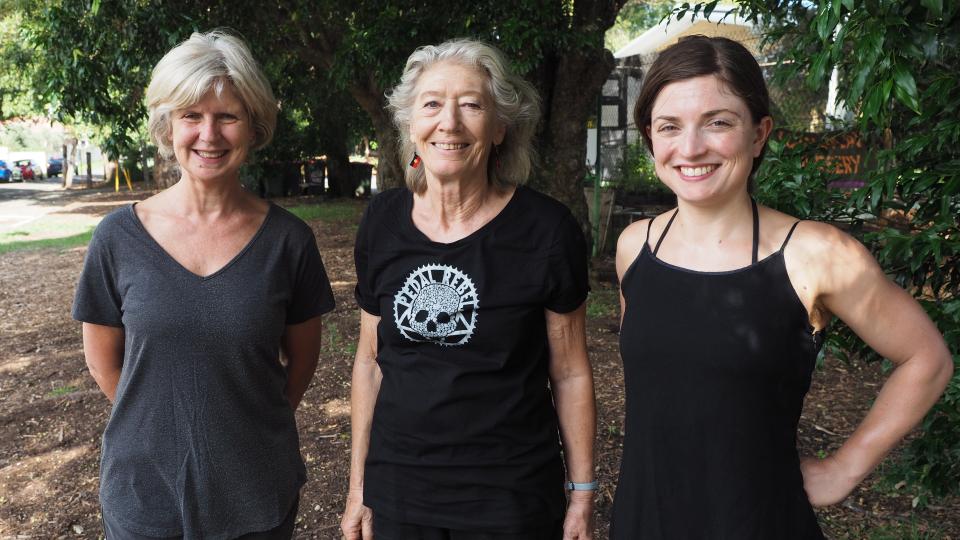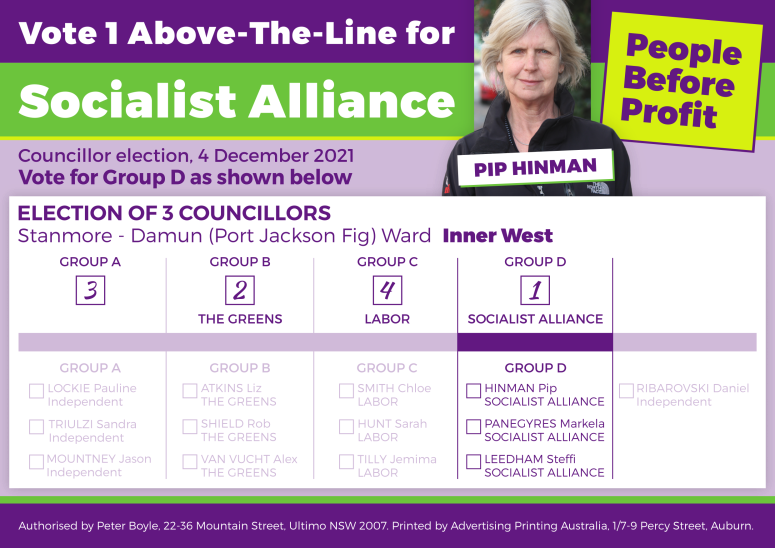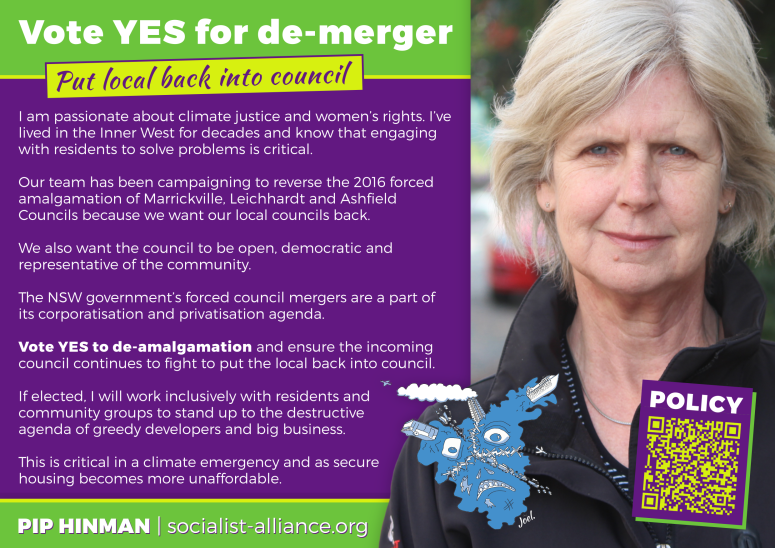People before profit: 2021 Inner West Council election campaign

Pip Hinman, Markela Panegyres and Steffi Leedham are standing in the Damun ward (formerly known as Stanmore) on December 4.
Policy platform
First Nations
The Gadigal/Wangal people of the Eora Nation are the Traditional Custodians of this land, which they have never ceded.
To that end, council should:
- Prioritise First Nations’ cultural heritage protection and visibility, starting with consultation with First Nations elders.
- Consult elders over marking the Frontier Wars in public places (including parks).
- Commit to mark, not celebrate, Invasion Day.
To promote initiatives against racism, council should:
- Support Asylum Seeker Resource Centre’ services.
- Assist vulnerable First Nations people and newly-arrived refugees access services, including housing and transport.
Environment and heritage
IWC includes large amounts of heritage buildings, parks and trees. It must ensure people and the environment are put before profit.
To that end, council should:
- Restore community say over development.
- Repurpose town halls for community use; no pepper-corn rentals for corporations.
- Apply stricter standards in building quality.
- Save Callan Park from developers and put it to community use, including conversion to affordable public housing, a new arts precinct and a specialist medical care centre.
- Extend the former Leichhardt council’s green waste recycling across IWC.
- Convert council fleet to 100% electric vehicles.
- Undertake an audit and take action to ensure full disability access to all public facilities.
Yes to de-amalgamation
Democracy in local government
Forced amalgamation has corporatised council and reduced local representation across Ashfield, Marrickville and Leichhardt from 36 councillors to only 15 in the Inner West Council.
Services have declined and people’s concerns are being ignored.
IWC meetings have impossibly long agendas, leaving councillors little to adequately consider the issues. Hand-picked committees of “professionals” have replaced real resident input.
Bigger has not meant better.
For a council that serves the community
The NSW government’s forced amalgamation was aimed at weakening local resistance to socially and environmentally irresponsible corporate-driven projects like WestConnex, and other inappropriate developments – especially along the rail corridor.
Its broader agenda is to sacrifice public assets and public good to boost the profits of its big business mates.
It doesn’t care if these mega councils go broke because that can be used to force them to privatise more community assets.
Government must pay for de-amalgamation
New amendments to the Local Government Act state the NSW government will pay for the cost of any de-amalgamation within 10 years of it taking place.
Vote yes to de-amalgamate and bring greater accountability and representation back.
Fair rates, no harmonisation
While rates are council’s main source of income, council must work with residents to secure greater state government funding for services it carries out locally.
The rate ‘harmonisation’ is unfair and, to that end, council should:
- Oppose rate rises in the form of “rate harmonisation” resulting from the forced amalgamation of Marrickville, Leichhardt and Ashfield Councils
- If there is to be any harmonisation, it should be to lower rates to that of the former Marrickville Council and any resulting income shortfall be met by the NSW government which forced amalgamation on our community in the first place.
In addition, council should be fighting for just and equitable rates including:
- Automatic zero rates for pensioners, the unemployed, single parents, people with disability and others dependent on welfare payments.
- Progressively means test rates on the basis of income: people should not be rated at the same level as landlords and speculators are for the sole home they occupy.
- The base rate for businesses should be higher than that of residents.
Climate emergency
The Inner West Council (IWC) should be more involved in taking real climate action. It should be promoting and actively seeking to achieve the goal of 100% renewable energy by 2030.
To that end, council should:
- Encourage renewable energy use throughout the local government area (LGA).
- Mandate new developments to meet the highest ratings of ecological sustainability.
- Establish a municipal energy company to work on providing cheap electricity, retrofitting homes, and promote solar panel cooperatives.
- To cool down the area: initiate tree-planting programs; support efforts to grow verges; preserve local greenspaces and waterways; and rehabilitate degraded environments.
- Convert town halls into “heat relief centres” during heatwaves.
- Revitalise unused council depots for urban food farming and gardens.
- Mandate an environmentally sustainable and ethical procurement policy.
- Improve recycling and reuse programs; and mandate recycling for local commercial and industrial tenants.
- Subsidise energy and water audits.
- Adopt the former Marrickville Council’s policy of opposing unconventional gas in New South Wales; and promote the existing position against lifting the ban on uranium mining.
- Prevent heritage trees from being destroyed
Cost of living pressures
IWC is up against budgetary pressures, but it cannot succumb to a user-pays approach.
To that end, it should:
- Push for full funding of council services by state and federal governments.
- Instigate a sliding scale of council rates indexed to household income.
- End the privatisation and outsourcing of council services.
- Where a service is provided by council, pass on state government rebates to help with water and rates bills.
- Expand meals on wheels food delivery service without aged care referrals.
- Establish an office to help gig economy/self-employed workers know their rights.
- Promote the establishment of food cooperatives to distribute local produce at a low cost, particularly to those in need; reinvest profit in green projects.
Housing affordability
A secure and safe roof over one’s head is a basic right. However affordable housing is increasingly out of reach for many.
To that end, council should:
- Emergency programs to house homeless people in vacant dwellings.
- Push for a minimum 30% of low-income housing in all major housing developments.
- Enhance lodgers’ rights in boarding houses.
- Support the push to cap rent at 30% or less of a person’s wage.
- Support renters’ rights; no forced evictions.
Open council and democracy
IWC has lost connection with residents and their concerns as it increasingly behaves like a corporate body. It needs to work with residents groups and empower residents to play a more active role in making decisions about their lives.
To that end, council should:
- Ballot residents on de-amalgamating the three councils.
- No more confidential briefings of councillors.
- Allow resident-initiated motions to council.
- Make the General Manager accountable.
- Establish regular ward and precinct meetings.
- Designate a portion of public works funds for projects that are to be decided upon by community consultation and vote.
Active and public transport
- Support residents’ campaigns against the privatisation of buses and trains
- Support the push to repurpose parts of WestConnex for mass transit vehicles
- Build more safer, permanent cycle paths
- Limit speed to 30-kilometre an hour in local streets
- Assist residents’ bid for compensation for damages or lost homes due to WestConnex
- Experiment with a monthly car-free Sunday in major shopping strips to encourage community amenity
- Source expert advice for active transport options
Childcare and children’s services
With many young families moving into the area, council support for childcare and out-of-school services remains important.
To that end, council should:
- Audit for such needs and repurpose unused council buildings and town halls to meet them
- Establish new childcare centres near green spaces
- Expand specific programs for children (including the Yellow Bus program)
COVID-19 emergency lock-down measures
Like everything in our lives, this election campaign has been affected by the COVID-19 pandemic. As councils are the level of government closest to the community, they have a role to play, especially in helping the most vulnerable.
To that end, council should:
- Provide support for essential services, such as supplying chemist scripts and food drop-offs
- Ensure public toilets and other amenities remain open and clean
- Support local distribution of facemasks
- Produce multilingual educational resources
- Expand food relief centres
We need your financial support!
We don't have any corporate donors, our people-powered campaign needs your support. Please email with your details to sydneyiw@socialist-alliance.org to let us know you have made a deposit so that we can receipt you as per the NSW Electoral Commission guidelines.
Socialist Alliance
BSB: 032 249
Account: 419 436
Authorised by P. Boyle, 22-36 Mountain St, Ultimo NSW 2007.
How to vote

